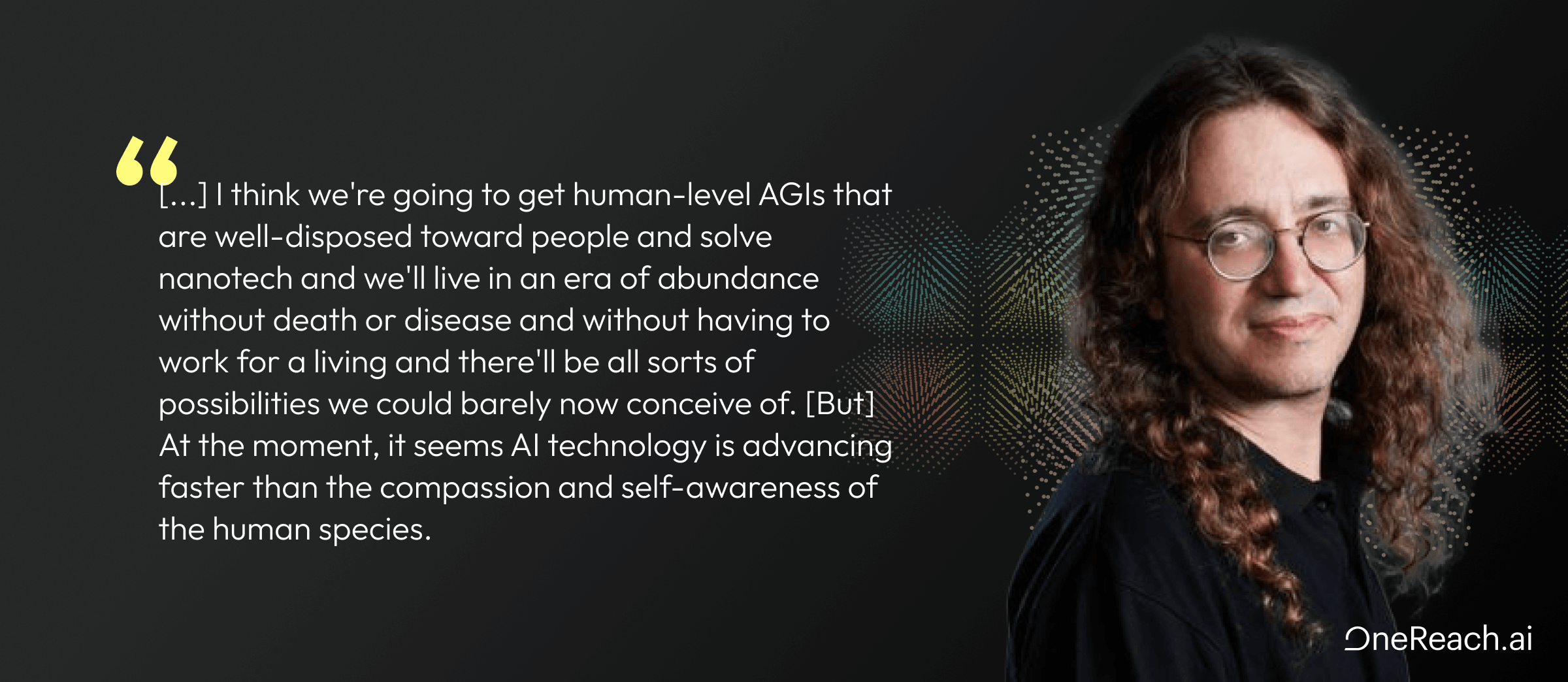
post
November 14, 2023
In Conversation with Ben Goertzel, Exploring the Role of Artificial General Intelligence
“We have this psychological property where we find the safe zone boring. So after we occupy there a little while, we do something else crazy just for the heck of it.” – Ben Goertzel
The concept of artificial general intelligence (AGI) has been a subject of both fascination and speculation for many years, evoking images of sci-fi movies and autonomous machines. When people hear “AGI,” they often think of a future where our technological creations outsmart and outperform them, potentially leading to our own obsolescence, or worse. This narrative is now transforming, however, especially in the business world.
In the fast-evolving landscape of technology, companies like OpenAI are at the forefront. The above-the-fold tagline on their homepage reads “Creating safe AGI that benefits all of humanity” At OneReach AI, the conversation has shifted towards realizing the potential of organizational artificial general intelligence—an AI ecosystem that “knows” all of the information captured in databases and unstructured content like emails and recorded calls. Organizational AI expands a company’s capabilities by massive factors, as employees and customers are able to engage in highly productive, context-rich, conversational experiences with brands.
On a recent episode of Invisible Machines, OneReach.ai CEO and co-founder Robb Wilson, and Director of Creative Content Josh Tyson had the privilege of engaging in an enlightening conversation with Ben Goertzel, a pioneer in the quest to democratize AGI. As the CEO of Singularity.net and chairman of the OpenCog Foundation, Ben’s vision is a future where artificial general intelligence is a decentralized global network, working for the collective benefit of humanity rather than serving the interests of a few massive companies.
Pursuing this outcome requires a stern reevaluation of our priorities, suggesting a shift towards inclusive innovation that actively works to destroy the global divide, ensuring that the benefits of advanced AI are accessible to all, not just a privileged few.
The domino effect of large language models
“[…] the choice of OpenAI and Microsoft to release chatGPT as they did has had a big effect on how people are thinking about AI, both in terms of narrow AI applications and in terms of the path forward to AGI.” – Ben Goertzel
While OpenAI’s code and model remain proprietary, they chose to open up ChatGPT for public use. Witnessing ChatGPT’s diverse functions, which were once deemed beyond the capabilities of machine intelligence, has been an eye-opener for many people. This revelation is rapidly transforming perceptions, making the prospect of thinking machines seem not just plausible but imminent. This awakening is crucial, as it fuels the attention towards artificial general intelligence, attracting more talented specialists, investments, and institutional support to the field, setting the stage for a future where AGI becomes a reality.
The real challenge of going from AI to AGI
The transition period, marked by potential job loss due to a combination of narrow AI and early-stage AGI, demands our attention. While developed countries might adapt with solutions like universal basic income, this leaves vulnerable populations in less affluent regions at a severe disadvantage, exacerbating global inequalities.
Moreover, the prospect of military establishments leveraging artificial general intelligence for nationalistic purposes adds a layer of complexity and potential danger to the equation. The geopolitical landscape, with specific reference to critical tech hubs, only heightens the urgency to address these challenges.
In the face of these impending issues, concerns about occasional glitches in human-robot interaction or fears of super AGI turning hostile seem secondary. The focus, as we navigate towards the singularity, should be on ensuring a just and equitable transition, mitigating the risks of rising inequality and potential global unrest.
“[…] we can raise up AGIs so that they’re reasonably compassionate to people, and there’s a risk of excessive anthropomorphism there also, but what I worry about more is the transitional period when the AGI is smart enough to benefit the haves differentially to the have-nots.” – Ben Goertzel
A human touch in a robotic world
As we stand on the precipice of a robotic revolution, it’s fascinating to consider the evolving landscape of job opportunities and human interaction. There’s an optimistic view that humans excel at creating new roles and niches, exemplified by the increase in baristas despite the prevalence of home cappuccino machines. Yet, it’s crucial to acknowledge the inevitable: automation in fast-paced environments like Starbucks is not just probable, it’s practical. The efficiency and cost-effectiveness of robots cannot be overlooked, and they might soon replace human baristas, while human interaction in high-end, bespoke experiences continues.
However, certain roles, such as preschool teachers and psychotherapists, carry an intrinsic need for a human connection, enriching our understanding and experience of humanity. The question then shifts from economic transactions to exploring voluntary interactions and fostering genuine human connections. As we navigate this transition, it becomes evident that while AI may reshape our job landscape, the irreplaceable value of human interaction persists in domains where it matters most.
“[…] live music is a great example of that because people will pay to go watch other humans play music, like even though you could listen to a recording, which probably is more reliable, it’s like the best virtuosos in the world playing, but you’ll pay to go see other humans perform because you like the fact that you’re in the room with other humans performing.” – Ben Goertzel
When will we get there?

The vision of a world bathed in abundance, free from the clutches of disease, death, and the necessity to work, presents a utopian image that’s hard not to be optimistic about. However, as we teeter on the edge of this revolutionary breakthrough, the transition period poses a complex mix of incredible potential and daunting challenges.
While visionaries like Ray Kurzweil predict a 16-year transition, unfolding in stages until 2045, there’s a shared consensus that the path will be fraught with both astonishing breakthroughs and unsettling turbulence. The pace of AI’s advancement is outstripping our own growth in compassionate self-awareness, raising questions about our readiness to handle what’s to come.
In this moment of unprecedented change, we find ourselves not just exploring technology but delving deep into existential reflections about our very humanity. How do we value ourselves in a world where productivity is no longer paramount? These conversations, crucial and timely, are not a diversion but an essential part of our jobs, as we grapple with defining our worth in segments of the population and in the broader scope of what it means to be human in the age of AI.
Stay up to date
Latest Articles




